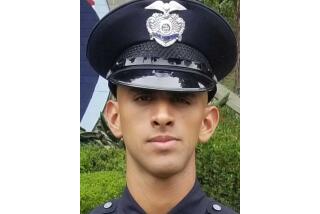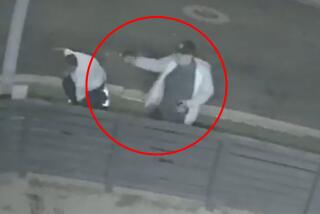TORRANCE : Men Get 30-Year Terms in Mistaken-Identity Killing
- Share via
Calling their crime a “cowardly, unbelievable act of violence,” a Torrance Superior Court judge sentenced two gang members to the maximum 30 years to life in prison for the doorstep slaying of a Gardena chemist they mistook for a rival.
Jeremiah Angel DeGuzman, 20, of Carson and John Paul Madrona, 19, of Redondo Beach sat silent as an angry Judge John P. Shook flayed them for the November, 1993, shooting of Tracy Takahashi.
“You must be punished and punished severely,” Shook told them.
In addition to the prison sentence, Shook also fined each man $10,000, saying they could earn the money by making license plates in prison.
Madrona’s attorney, Edward Robinson of Redondo Beach, said that although most California prisoners serve a little more than half of their sentences, his client will be imprisoned more than 20 years because of the public’s outrage over the mistaken-identity murder.
Deputy Dist. Atty. Gregory D. Jennings said: “All (Takahashi) did was answer his own door.”
Apparently looking for revenge on a rival who had recently testified against another member of their gang, DeGuzman and Madrona rang the bell at a South Dalton Avenue apartment shortly after midnight Nov. 16, 1993. But the man prosecutors believe they planned to kill lived next door, in a virtually identical apartment.
Takahashi--a boyish 30-year-old environmental chemist who had spent the evening playing volleyball and having dinner with friends--opened his door, and the two shot him at least seven times.
Members of DeGuzman and Madrona’s gang testified against them in exchange for immunity. A jury deliberated four hours before convicting both men last month.
Before handing down the sentences last Thursday, Judge Shook read a letter from Takahashi’s younger brother, Dean, a former business writer for The Times.
“At the time of sentencing, I think it’s important for everyone involved in this case to be reminded that Tracy was a real person,” Dean Takahashi wrote. “His home was a gathering place. Friends often came over . . . and stayed late into the night. That’s why he answered the door so freely. He thought he was greeting a friend.”
More to Read
Sign up for Essential California
The most important California stories and recommendations in your inbox every morning.
You may occasionally receive promotional content from the Los Angeles Times.













